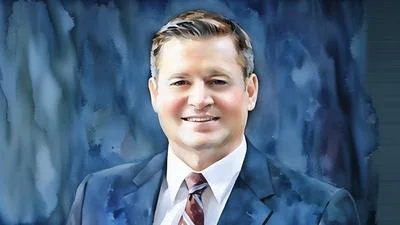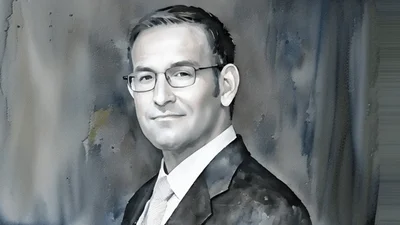This transcript has been edited for length and clarity.
Professor Sulmaan Wasif Khan is Denison Chair in history and international relations at the Fletcher School at Tufts University. He is the author of “The Struggle for Taiwan: A History of America, China, and the Island Caught Between.”
Federal Newswire
How did you pick the starting point for your book?
Sulmaan Wasif Khan
The year you're referring to is 1943, which is the year of the Cairo Declaration, which “restores Taiwan to the Republic of China.” That seemed to be a logical starting point for America's involvement with this particular story and the foundation of the idea.
Going back earlier and saying where Taiwan was and what it was seemed important. It's an island 100 miles off the coast of China. Before 1943, and certainly before the Qing dynasty came along, [it was] a maritime waystation between East and Southeast Asia.
China, of course, has had conquest dynasties rule over it, too. The Qing Empire, is what sweeps down, incorporates China and then incorporates Taiwan in 1683. So when Taiwan and China are first joined under one polity, it's the Qing empire. It's not China and that was important to remember.
When in 1943, FDR and Chiang Kai-Shek were talking about restoring Taiwan to the Republic of China, there's a lot of context missing.
Federal Newswire
What elements were missed in the Cairo Declaration that would have helped America set policy towards Taiwan and China?
Sulmaan Wasif Khan
What was interesting to me was that our policy was very often a bunch of knee-jerk reactions. It's almost like it was on autopilot. It's also interesting that certain hints at better policy were missed. George Kennan at one point or another said, “maybe Taiwan should be a self-determined nation.” You'd think if that had happened before 1950, we wouldn't be having this conversation right now.
American policy towards China at this point is being tied to Chiang Kai Shek not wanting to remain tied to [China] and George Marshall, making the crucial decision that the United States was not going to intervene militarily on Chiang Kai Shek's behalf.
Key point which means that when the communists under Mao conquer most of China and Chiang is beaten back to Taiwan, the betting money before the Korean War would have been that sooner or later…Taiwan was going to be a part of China, unless one went with the idea of self-determination for Taiwan, which nobody seemed to have much appetite for.
Kennan walks that memo back, but it's the Korean War that really sets the tone for what happens going forward. Because that's when Harry Truman sent the Seventh Fleet to the Taiwan Strait, solidifying the separation between China and Taiwan–the origins of the problem that lives with us to this day.
Federal Newswire
Can you elaborate on the views of the Chinese Communist Party and Mao towards Taiwan?
Sulmaan Wasif Khan
You have to remember that for Mao, a fully united China isn't something he grew up with. It's not a given. A divided China and little bits here and there is not something that is ipso-facto bad to him. He advocates self-determination for Taiwan in conversations with Edgar Snow, and advocates self-determination for Tibet and Xinjiang. That began to change in 1949.
There are two different points of view on this. One is that he was always hiding his real intentions, and once he came to power he showed his true intentions, which is a perfectly plausible interpretation. What's more plausible is that he changed his mind as he went along, and he changed his mind partly because as you age, you become less idealistic.
But the other thing that happens is the Communists start seeing the frontier regions as places where the United States is using local actors to undermine the strength of the PRC. Self-determination in 1949 is not as attractive as it was even a decade before, with some justification, I might add. There were American plans to use those places in various ways.
The other thing that happens with respect to Taiwan is that Chiang Kai Shek's removal there means that there is an alternative head honcho for China, and one whom Mao has come more and more to identify as a personal enemy.
At the beginning of the Civil War, it almost seemed as if two China's would have been a possibility. There's been enough bad blood, bloodshed, and violence that that's no longer in the cards, and nothing but the complete extermination of Chiang and this regime would really seem to satisfy Mao. That's where Taiwan…comes to be seen as something that the PRC has to take.
Federal Newswire
How was Chiang Kai Shek’s move to Taiwan perceived by the Taiwanese already residing there?
Sulmaan Wasif Khan
To understand what Chiang Kai Shek did, it helps to use the term “settler colonialism.” If you look at the population movements, if you look at the way rule was enforced, Chiang Kai Shek takes a bunch of people from China, transplants them to Taiwan and says, “here's how you're all going to live now.”
You basically have a bunch of people without any say in their government being told you are now part of China, and that the state doesn't rule in reality, but claims to rule whether you like it or not. If you don't like it, you're going to be incarcerated or executed. It's pretty natural under those circumstances that an independence movement would flourish. You have Taiwanese hiding out across the globe saying, “someday we're going to be independent.”
When Nixon and Kissinger go to China, one of the things the Chinese are very insistent on is no independent Taiwan, no “one China” and “one Taiwan.”
You can't keep incarcerating people without expecting them to at some level turn against you. The independence movement that emerges and that I think is in some ways the progenitor to the politics of Taiwan today is one that sees Taiwan as distinct from China. That means it is distinct from Chiang Kai Shek, and the KMT under Chiang Kai Shek is exactly what they're declaring independence from.
Federal Newswire
What points have experts missed since the President Lee era?
Sulmaan Wasif Khan
Let's back up with Tiananmen, because that divides opinion on Taiwan as it does in the United States. There's a school of thought that says this is awful and barbaric. How could anybody allow this to happen? Perfectly reasonable.
There's also a bunch of Taiwanese business people saying this is a great business opportunity with other people [imposing] sanctions. Let's get in and get rich, which also happens.
Taiwan, like any democracy, has a bunch of opinions on how to relate to China. There are forces that say, one country-two systems might be the way to go at some point. It's an argument that becomes harder to sustain in the Xi Jinping era.
There is a panoply of opinions, and that's going to be a waxing and waning of how close we want to be to China.
Another key point that gets taken for granted is the transition of power. The KMT does pass power to the DPP. The DPP is accused of corruption, and loses an election. Power goes back to Chen Shui Bian and he is tried and convicted.
This is how democracies are supposed to work. it's not something that you can take for granted, but it does happen. It also happens with a bunch of behavior abroad that's going to cost Taiwan friendships.
I mentioned Costa Rica in the book where Taiwanese fishermen were caught in a massive shark finning operation. So… being a democracy is not a guarantee of being all good things. That's a key point.
The most important thing that happens in this relationship with China is best summed up by a book by Shirley Lin called “Taiwan's China Dilemma.” The dilemma is that even as the China and Taiwan economies grow more and more integrated, a sense of separate Taiwanese identity begins to strengthen. In other words, as Taiwan becomes more dependent on China, there's a sense that it might be too dependent, which is what culminates in the Sunflower Movement.
The sunflowers are interesting, because they're protesting an economic deal that my NGO has overseen with China. But they're also protesting because they feel their futures are being sold out. Every generation has its protest and this is theirs.
Federal Newswire
What trends should we watch for?
Sulmaan Wasif Khan
That particular movement shows the DPP that there is something we can tap into here. There is a discontent with the status quo and the growing closeness with China. It's easy to forget that in 2014 and 2013, it actually looked like they might find a way of getting along peacefully. But the DPP can tap into that dissatisfaction.
What strengthens Taiwan's hand is the growing perception in this country that it's time to get tough on China. In other words, once upon a time you had George W. Bush saying, “I do not support or oppose Taiwanese independence– it's all the same to me.” You now have people saying, “no, we have to get tough on China.”
Part of that is being nice to Taiwan. All of a sudden you have things like Nancy Pelosi visiting Taiwan. That's one part of the context.
The other thing of course was Covid, because Covid does two things. It sharpens the perception that one needs to get tough on China, and it also creates a narrative that Taiwan tried to do the right thing.
Federal Newswire
Where can people get more information?
Sulmaan Wasif Khan
I mentioned Shirley Lin's book. Shelley Rigger has done fantastic stuff, and Tonio Andrada has done fantastic stuff.
The China Desk podcast is hosted by Steve Yates, a former president of Radio Free Asia and White House national security advisor.









